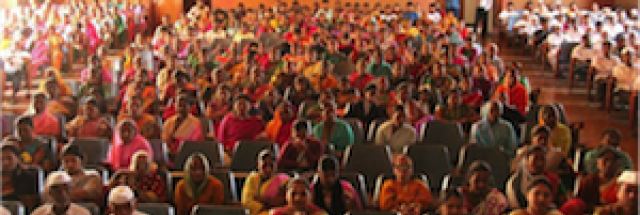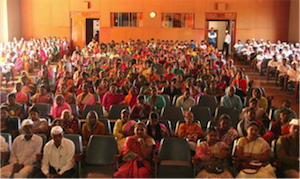 Members of the Farmers’ Dialogue team admire the work that is being done through GRAMPARI at Asia Plateau. When some of our team first visited Asia Plateau in 1966 it was a bare hillside which is now covered in trees and a source of much wildlife. Later, in 2002, some of our colleagues from East Africa came to Asia Plateau to attend an International Farmers’ Dialogue followed by visits to Indian farms, and they were so inspired by what they had seen and heard that they decided to work together to hold similar events in their countries. This programme has since then expanded to involve Tanzania, Kenya, Uganda, Rwanda, DR Congo, Mayotte and is reaching out to Southern Sudan and Burundi to name some with contacts reaching beyond that into other parts of the world.
Members of the Farmers’ Dialogue team admire the work that is being done through GRAMPARI at Asia Plateau. When some of our team first visited Asia Plateau in 1966 it was a bare hillside which is now covered in trees and a source of much wildlife. Later, in 2002, some of our colleagues from East Africa came to Asia Plateau to attend an International Farmers’ Dialogue followed by visits to Indian farms, and they were so inspired by what they had seen and heard that they decided to work together to hold similar events in their countries. This programme has since then expanded to involve Tanzania, Kenya, Uganda, Rwanda, DR Congo, Mayotte and is reaching out to Southern Sudan and Burundi to name some with contacts reaching beyond that into other parts of the world.
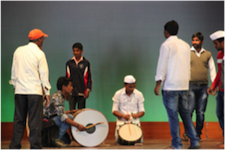 The 50th year of Asia Plateau and the 10th year of Grampari started with 350 villagers and 150 trainees, volunteers, 10 from Jharkhand and staff thronging for a day long programme (photo top left). Farmers and villagers from 17 villages around Panchgani where Grampari has been working were invited to the celebrations in January 2017.
The 50th year of Asia Plateau and the 10th year of Grampari started with 350 villagers and 150 trainees, volunteers, 10 from Jharkhand and staff thronging for a day long programme (photo top left). Farmers and villagers from 17 villages around Panchgani where Grampari has been working were invited to the celebrations in January 2017.
A short history of the centre with emphasis on the reforestation programme and its impact on the wells in the centre and the others around the centre was highlighted as was the water harvesting systems in the centre. The Yadav brothers’ story of reconciliation was recounted acknowledging the presence of Prahlad Yadav son of Maruti Yadav.
Kalpana Kharat welcomed people on behalf of the AP staff and Sudhir Gogate welcomed them on behalf of Asia Plateau.
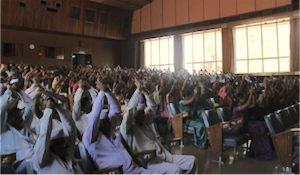 From Grampari’s welcome was unique: Dipak Jadhav asked the audience to put up their hands if they felt part of the centre and Grampari. Everyone put up their hands he then asked them to welcome themselves to their centre with their other hand. This was appreciated with a loud applause that followed.
From Grampari’s welcome was unique: Dipak Jadhav asked the audience to put up their hands if they felt part of the centre and Grampari. Everyone put up their hands he then asked them to welcome themselves to their centre with their other hand. This was appreciated with a loud applause that followed.
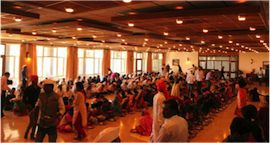 Four hundred people ate a meal served on leaf plates in the main dining hall sitting on the floor. Grampari youth group of 70 along with the Jharkhand group, interns and IFLers served the meal. The whole operation was done without a hitch.
Four hundred people ate a meal served on leaf plates in the main dining hall sitting on the floor. Grampari youth group of 70 along with the Jharkhand group, interns and IFLers served the meal. The whole operation was done without a hitch.
The invitation to the programme raised issues like, use and conservation of water, adequate and safe food supplies, poverty, and intolerance leading to violence. Ways in which the problems could be solved on a global scale was discussed and individuals who were addressing them at their level shared their experience.
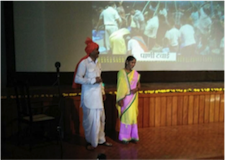 Ashok More a farmer from the village of Pachpute wadi spoke of his personal change. He spoke of the way he used to beat up his wife under the influence of alcohol, which he decided to give up and apologised to his wife for his behaviour. He acknowledged his wife’s contribution to the family. His wife Sangeeta was on the stage with him.
Ashok More a farmer from the village of Pachpute wadi spoke of his personal change. He spoke of the way he used to beat up his wife under the influence of alcohol, which he decided to give up and apologised to his wife for his behaviour. He acknowledged his wife’s contribution to the family. His wife Sangeeta was on the stage with him.
He also spoke of his work with spring protection and water recharge, which has given clean drinking water to about 6000 people. He shares his personal story with the people who work with him as they build the spring boxes often having times of quiet on the hillsides.
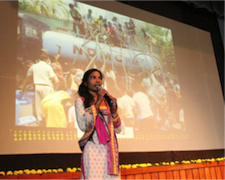 A frail looking girl, Sheila from Jharkhand told us about her attempt to bring water to the village where there was only one tap for 40 families. She decided to meet the officials and press for more taps. Instead of helping, they started abusing her saying, 'Do you have no other work than sitting here for hours?' She responded, 'This is my important work' and would not move. In the end, the officials gave in and now there are six taps in the village.
A frail looking girl, Sheila from Jharkhand told us about her attempt to bring water to the village where there was only one tap for 40 families. She decided to meet the officials and press for more taps. Instead of helping, they started abusing her saying, 'Do you have no other work than sitting here for hours?' She responded, 'This is my important work' and would not move. In the end, the officials gave in and now there are six taps in the village.
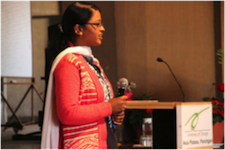 Usha Malusare a shy weak girl, who hardly raised her head, attended the first Grampari sewing class reluctantly. They are being conducted at a very low cost in 2008. Unable to bear the treatment meted out to her by her in laws and being married to a mentally unstable man, she had gone back to her parents’ home. Even there she was not accepted with dignity because of the stigma attached to a ‘woman who left her husband’ and there was mistreatment home. Quick to learn, Usha learnt sewing effortlessly and took a leading role in the women’s group. An independent and confident Usha now leads a dignified life, earning well and respected by all. She said those people from whom I had to beg now ask me for money, 'Somewhere I feel good about that'. Usha’s was a live story of getting oneself out of poverty. Usha’s business is doing so well that she gets no time even to come for Grampari meetings!
Usha Malusare a shy weak girl, who hardly raised her head, attended the first Grampari sewing class reluctantly. They are being conducted at a very low cost in 2008. Unable to bear the treatment meted out to her by her in laws and being married to a mentally unstable man, she had gone back to her parents’ home. Even there she was not accepted with dignity because of the stigma attached to a ‘woman who left her husband’ and there was mistreatment home. Quick to learn, Usha learnt sewing effortlessly and took a leading role in the women’s group. An independent and confident Usha now leads a dignified life, earning well and respected by all. She said those people from whom I had to beg now ask me for money, 'Somewhere I feel good about that'. Usha’s was a live story of getting oneself out of poverty. Usha’s business is doing so well that she gets no time even to come for Grampari meetings!
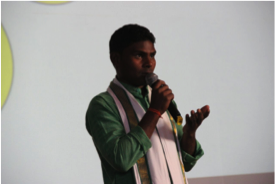 Dhrupad, a young man from a village in Jharkhand talked of how he had given up tobacco and tackled his anger and jealousies; he had the thought to build a road for his village, which he did by mobilising his friends.
Dhrupad, a young man from a village in Jharkhand talked of how he had given up tobacco and tackled his anger and jealousies; he had the thought to build a road for his village, which he did by mobilising his friends.
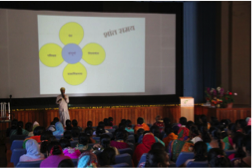 Ramprasad had indulged in all kinds of drugs and decided to give up the habit. He then remembered that once he was drunk and beaten up a bus driver. When he searched and found the driver to made amends he discovered the driver was very poor and was living in a pathetic condition. Not only did he apologise, but helped the drivers’ son get a job.
Ramprasad had indulged in all kinds of drugs and decided to give up the habit. He then remembered that once he was drunk and beaten up a bus driver. When he searched and found the driver to made amends he discovered the driver was very poor and was living in a pathetic condition. Not only did he apologise, but helped the drivers’ son get a job.
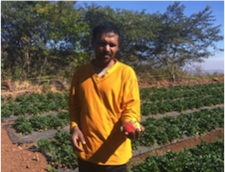 Two enterprising women, Swati Shingade and Suvarna Shedge, spoke about their experience of sustainable farming. Shingade resigned as an IPS officer to take to farming. She talked about how she had made good profit through alternative farming methods. Another farmer from Godavali Lakshuman told us about how he had started growing organic strawberries. He was inspired by a talk in Grampari by Padmashri Subhash Palekar who promotes zero budget agriculture. He also talked about how his input costs and burdens had reduced.
Two enterprising women, Swati Shingade and Suvarna Shedge, spoke about their experience of sustainable farming. Shingade resigned as an IPS officer to take to farming. She talked about how she had made good profit through alternative farming methods. Another farmer from Godavali Lakshuman told us about how he had started growing organic strawberries. He was inspired by a talk in Grampari by Padmashri Subhash Palekar who promotes zero budget agriculture. He also talked about how his input costs and burdens had reduced.
Ganesh Pujari from Wai spoke of prejudice and his resentment towards another community. He was able to overcome this by listening to his inner prompting to accept an invitation from an old couple from the other community during their festival. He was so touched by the love and care bestowed on him that his prejudice and anger vanished towards the community.
The five minute quiet time that asked for was observed with pin drop silence.
The whole programme was supported by 70 village youth the each of whom had taken many corrective steps in their lives.

